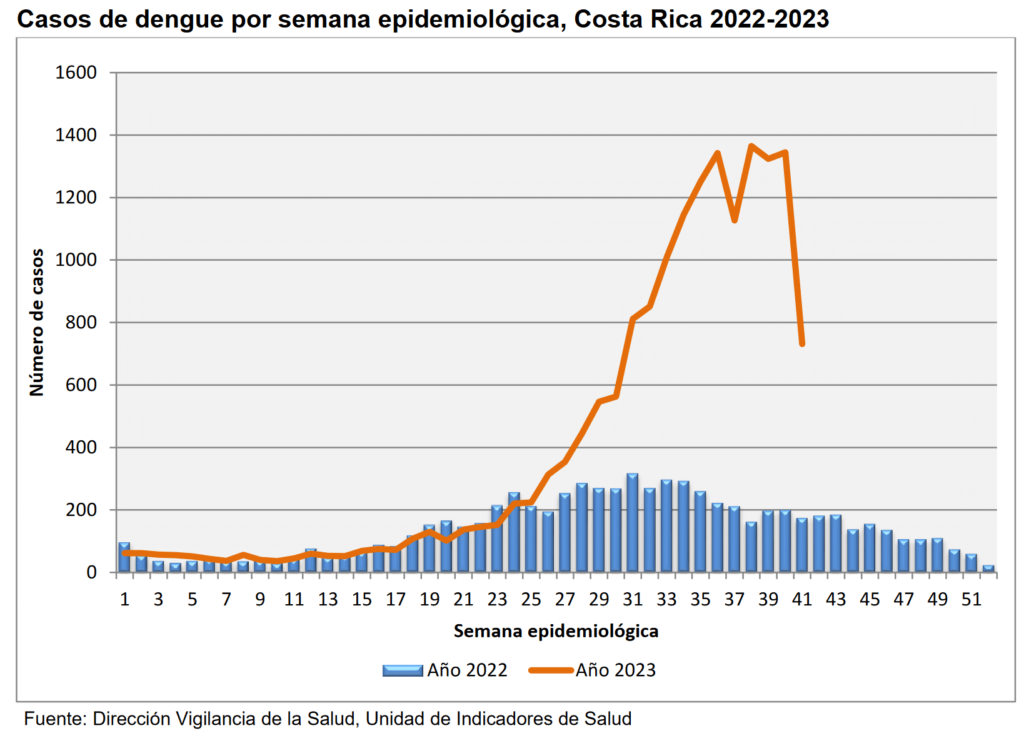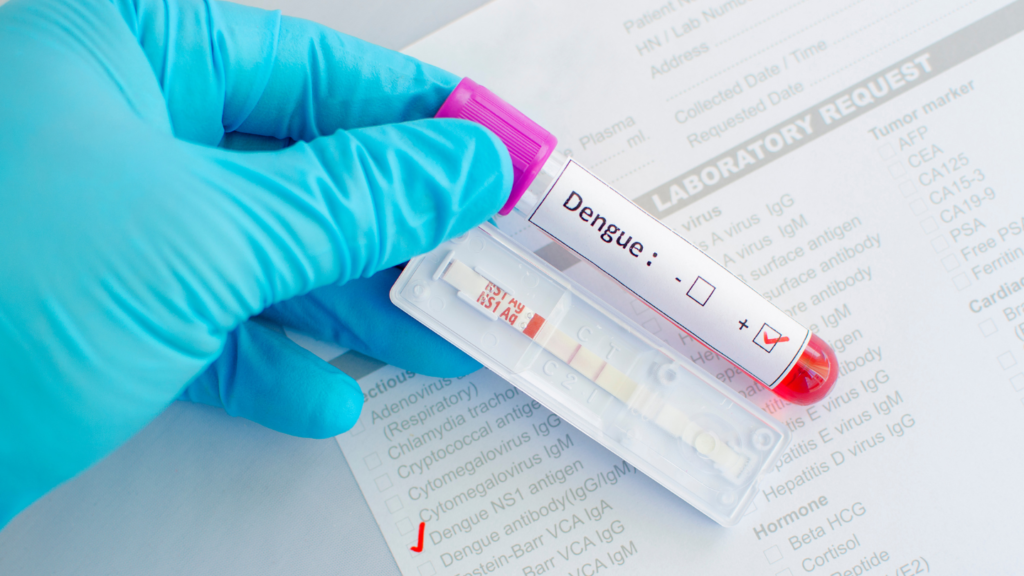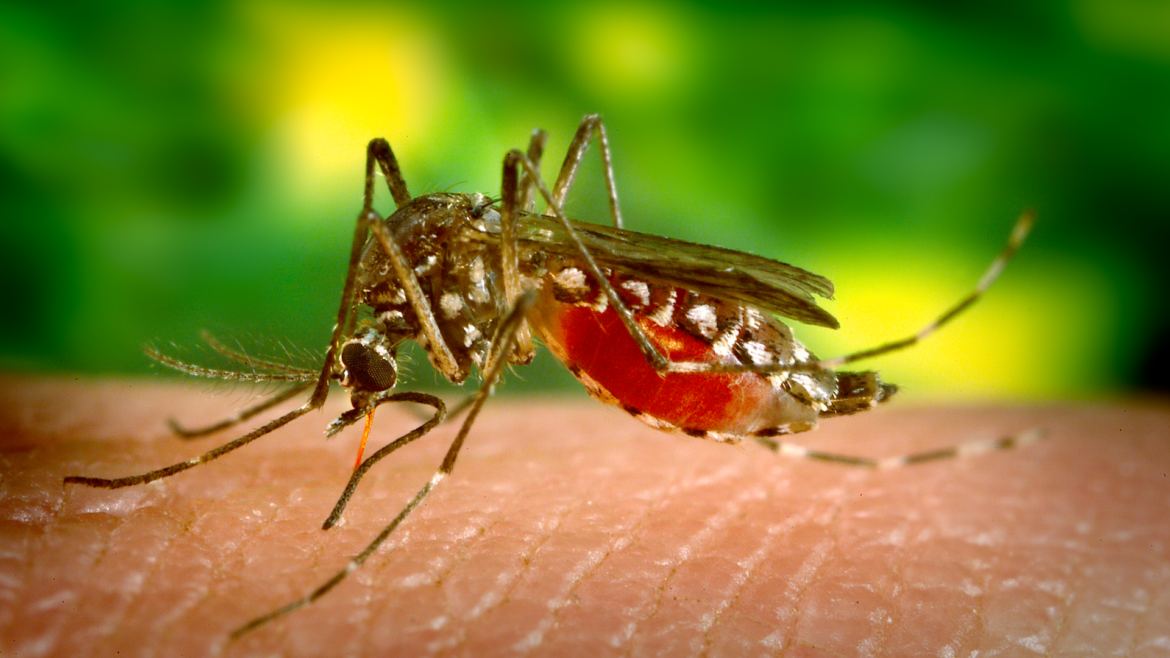As the tourist season approaches in Costa Rica, it’s crucial to stay informed about the current dengue situation, especially in the country’s wet regions. Increased vigilance is recommended.
Statistics show a total of 16,667 dengue cases since the start of this year, while the previous year ended with 7,485 infections.
Costa Rica is facing a significant outbreak of dengue in 2023. According to the Health Ministry’s data, as of last week, the total number of 2022 cases was surpassed by 9,182.
Reviewing data from the past three years underscores the challenging situation the country is experiencing:
2020: 10,056 cases
2021: 5,081 cases
2022: 7,485 cases
This year, five severe dengue cases have been recorded, while none were reported in 2022. The Children’s Hospital reports, so far, seven young individuals hospitalized due to warning signs of the disease.
« There are acute dengue cases that can manifest without warning signs. They are closely monitored on an outpatient basis. On the other hand, there are patients with dengue displaying warning signs, which can be fatal. »
Marcela Hernández from the Children’s Hospital’s Department of Medicine.

Costa Rica issued a health alert due to the rise in cases since September 6, and the data shows exponential growth over the past four months.
Acute dengue cases with warning signs display:
- Abdominal pain
- Vomiting
- Fatigue and weakness
- Dehydration
- Consciousness disorders
- Bleeding signs, like unexplained bruises
- Petechiae (small red to purplish skin spots)
« If a patient shows these symptoms, hospitalization is advised because more severe symptoms might arise, such as low blood pressure or shock due to fluid loss, » explained Hernández.
It’s also recommended that if one suspects dengue, they should immediately seek medical attention and avoid self-medication.

« A person infected with dengue can recover well, but if re-infected by another serotype, they might develop hemorrhagic dengue, which can be fatal, » warned the ministry.
Currently, all four dengue serotypes are in circulation, a situation not seen in 23 years.
The Pan American Health Organization (PAHO) states that in most cases, dengue causes mild symptoms or even none and recovers in one or two weeks. However, in rare instances, it worsens and can be deadly.
Symptoms typically appear between 4 to 10 days post-infection and last from 2 to 7 days, which include:
- High fever (40°C/104°F)
- Intense headaches
- Eye pain
- Muscle and joint pains
- Swollen lymph nodes
- Skin rash
The World Health Organization (WHO) has warned that global warming is increasing cases worldwide, and this year we might reach historical records. « Dengue is the world’s fastest-spreading tropical disease and poses a « pandemic threat, » warned the WHO.
Prevention:
The public is also urged to adopt preventive measures and actions to reduce cases.
« The ministry can’t eliminate dengue on its own. From our side, we’re reinforcing actions we’ve already taken and hope you do the same at home. It only takes 10 minutes or less a week and can protect our families. »
Mary Munive, Costa Rica’s Health Minister.
« Dengue is a disease we can control if we eliminate all breeding sites around us, » emphasized Munive.
According to the Health Ministry, from October 23 to November 3, fumigations and home visits will intensify as part of targeted efforts in the hardest-hit provinces.
Dengue is an acute viral disease, transmitted by the infected female Aedes aegypti mosquito, which also carries zika and chikungunya.
To prevent mosquito transmission, at home, you can:
- Regularly clean and empty water containers
- Check and clean gutters
- Discard all black plastics in yards that collect water
- Store unused tires under cover or take them to collection sites
- If visiting high-risk infection areas, use repellent, wear long-sleeved clothing, and sleep under mosquito nets.
Fighting dengue isn’t just the responsibility of healthcare professionals or authorities; it begins with us, in our homes, gardens, and neighborhoods. Let’s adopt preventive behaviors, stay informed, and work together to eradicate this threat. Vigilance is the price of our collective safety.

- Revolutionizing Storage in Guanacaste: Storage del Norte is Now Open
- Quand deux Québécois réinventent l’entreposage au Costa Rica
- Guana Safe Air: Raising the Bar for Air Conditioning Services in Costa Rica
- Guana Safe Air révolutionne l’entretien des climatiseurs dans le Guanacaste
- Une route alternative pour réduire la congestion au Guanacaste


